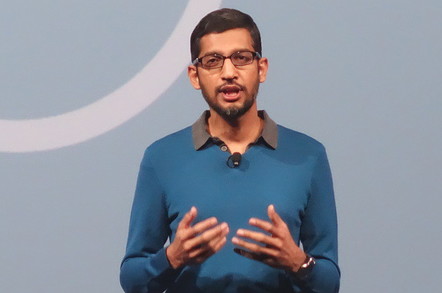Google now minus Google Plus: Social mini-network faces axe in data leak bug drama
Project Zero would have been all over this – yet it remained under wraps

Google CEO Sundar Pichai … It’s not you, there’s basically none of you, it’s us
Google has surprised Google+ users – all two of them – by vowing to shutter the service over the next ten months in the wake of a potential data leak.
In what has become an all-too-familiar scenario, the decision is subject to claim and counter-claim: The Wall Street Journal today alleged that Google covered up a programming blunder that would have exposed people’s private Google+ account data to app developers, all because the advertising giant didn’t want to have to deal with the PR and regulatory fallout from admitting it screwed up.
Meanwhile, Google said the flaw was an unexploited API bug discovered and fixed internally before anyone externally found it – and in any case, it’s shuttering Google+ because netizens don’t use it. Businesses will still be able to use the service as an internal chat channel, though.
According to a statement today by Google engineering veep Ben Smith, the coding cockup was found in an API review dubbed Project Strobe. Before the bug was fixed, the API could have been exploited by applications connected to Google+ accounts to access the private parts of those profiles. Specifically, third-party applications linked to G+ accounts “had access to Profile fields that were shared with the user, but not marked as public.”
Amusingly, after years of Google PR playing down the small number of active G+ users, it’s also now trying to spin that everything’s going to be OK because virtually no one used the social network.
dark comedy: google plus PR spent five years trying to dissuade writing about the network’s absymal usage numbers
now that it leaked everyone’s data, google can’t get enough of telling people how no one used it https://t.co/iGocHG7vpA
— rat king (@MikeIsaac) October 8, 2018
The software bug, Smith explained, would only have exposed “name, email address, occupation, gender and age,” if exploited, and not “Google+ posts, messages, Google account data, phone numbers or G Suite content.” The executive noted that while 438 apps could have leveraged the API’s security hole, and 500,000 accounts would have been affected in that case, Google’s review found “no evidence” that third-party developers had noticed the bug.
The WSJ story quoted unnamed sources that Google chose not to ‘fess up to the bug in public because it feared “regulatory scrutiny” and “reputational damage.”
Google’s response: “Our Privacy & Data Protection Office reviewed this issue, looking at the type of data involved, whether we could accurately identify the users to inform, whether there was any evidence of misuse, and whether there were any actions a developer or user could take in response. None of these thresholds were met in this instance.”
Regardless of the API gaffe, Google said low user take-up and engagement drove its decision to shutter the normie side of Google+. The service, Smith said, failed both in consumer adoption and engagement with apps: “90 percent of Google+ user sessions are less than five seconds.”
Some infosec bods have taken Google’s side, arguing disclosure is only needed if there’s evidence of a security breach. Otherwise, it’s just another bug fix, in their eyes. Security and privacy researcher Lukasz Olejnik said the story “should not be taken out of proportion” because the bug was “found and fixed.”
Another security researcher, Ryan Satterfield, was even more critical:
This WSJ article on the Google+ bug is factually incorrect in many ways.
1. You do not have to disclose a flaw that no one used!
2. No one used it, no one found it, so why is this an article?
3. Stop fear-mongering! https://t.co/s3EpED7UGC— Ryan Satterfield (@I_am_ryan_S) October 8, 2018
On the other hand, of course, Google’s Project Zero team publicly skewers organizations and projects that fall short in terms of security, calling out vulnerabilities in products whether they were actively exploited or not. It’s perhaps another case of arrogant Google’s do-as-we-say, not-as-we-do approach to technology and life. If this were a bug in Facebook discovered by Project Zero, it would have been documented by the team in public for all to see – yet Google kept a lid on its own cockup.
Home improvements
Google’s Smith also outlined a slew of other changes pitched as privacy enhancements. These include more granular Google account permissions; limits on apps able to access Gmail accounts; and limits on apps’ ability to access Android call logs and text messages.
The most important of these is the change to Gmail access, described in more detail here:
Finally, the Android contacts API will no longer let third-party apps access interactions with contacts. ®
Sponsored: Following Bottomline’s journey to the Hybrid Cloud
READ MORE HERE


